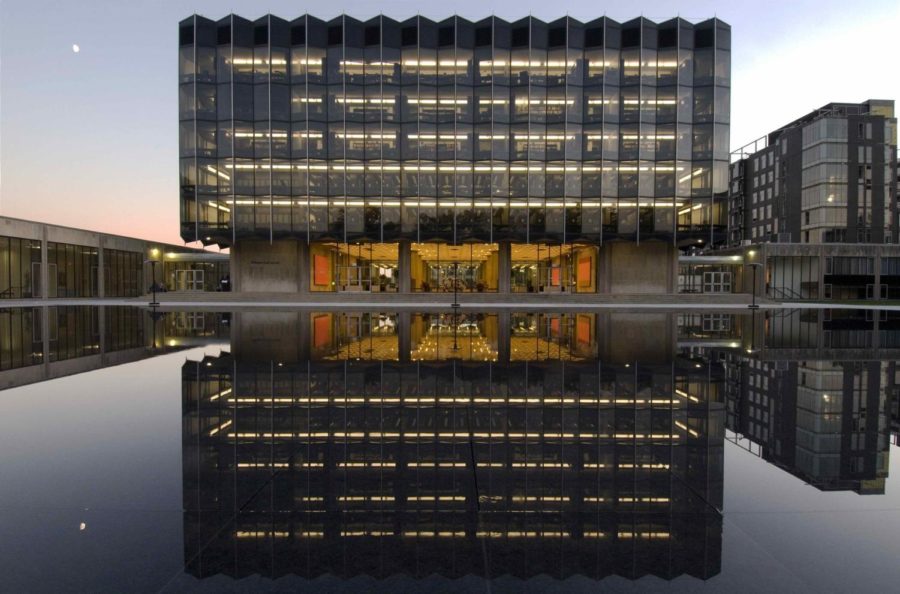All five racial and ethnic affinity groups at the Law School will boycott Admitted Students Weekend early next quarter, the Black Law Students Association (BLSA) announced in a petition sent to Law School administrators on Monday.
BLSA decided to organize the boycott of one of the Law School’s largest annual recruitment events after administrators did not condemn law professor Geoffrey Stone’s longtime use of a racial epithet in class, a controversy that recently resurfaced. The other affinity groups participating are the Latinx, Asian and Pacific American, South Asian, and Southwest Asian and North Afrikan Law Students Associations.
Affinity groups had informally talked about a boycott last year, Kelly Yin, co-president of the Asian and Pacific American Law Students Association (APALSA), said. The thought surfaced when administrators took no action against a campus debate group that published a deliberately provocative whip sheet saying immigrants bring “disease into the body politic.”
The boycott represents a major blow to Admitted Students Weekend, which spans the first Thursday to Saturday of spring quarter. The groups are usually tasked with e-mailing admitted students of color weeks in advance to encourage them to come, planning lunch discussions and social events, and participating in panels throughout the weekend.
BLSA President Amiri Lampley said, “We’re not telling [admits] to not come here,” and added that BLSA will e-mail admits explaining why they are boycotting. BLSA’s petition notes that BLSA “will engage with admits of color on our own terms.”
The conflict underpinning the boycott stems from disparate views of how the University's Chicago Principles on free speech should be applied. Law School administrators believe that, in accordance with the Chicago Principles, they have a presumption against weighing in on the speech used by a professor or campus group. The affinity groups, however, believe that in instances in which speech causes enough harm to students, administrators should weigh in.
“Free speech is not free, and as it is currently applied, the University’s free speech policy, the ‘Chicago Principles,’ leaves Black students bearing the costs,” BLSA said in the petition.
The petition, also published as an online petition, asks the Law School to “reconsider its absolute embrace of the University’s Freedom of Speech policy, or at the very least, reassess when and how the exceptions are applicable.” The petition also asks the Law School to “adopt an affirmative statement that expresses the Law School’s commitment to diversity and inclusion, professional ethics, and the fundamental pillar of civil discourse.”
Controversy surrounding the racial epithet began last week after a law student published an op-ed criticizing Stone’s use of the epithet in class. Members of BLSA engaged in a public conversation with Stone the day after the op-ed published, and shortly after, he decided to stop saying the epithet.
Lampley said that though Stone has decided to stop saying the epithet, “the issue goes far beyond the use of the N-word,” adding that administrators permitting Stone to say the epithet despite recent criticism is “symptomatic of a larger issue in the Law School.”
Law School Dean Thomas Miles sent an e-mail to students on Sunday addressing last week’s events but did not take a stance, saying, “I admire the students who challenged a distinguished faculty member’s long-held view with well-focused and powerful arguments. I admire the faculty colleague who listened closely and revised his view.”
“I reaffirm that we are deeply invested in the health, happiness, and intellectual growth of every student,” he continued in the e-mail. He also addressed diversity at the Law School, saying, “Our commitment to diversity is central to our mission of inquiry and exploring multiple perspectives and to building an intellectual and professional community that mirrors our diverse world.”
Asked to comment on the petition, Miles said in a statement to The Maroon, “I appreciate our students raising these challenging and sometimes painful issues, and we know there is much work to be done to ensure that the Law School community is welcoming to all students and responsive to such concerns.” He also said he will meet with BLSA after final exams, which end this week.
According to Lampley, BLSA is choosing to withdraw from the Law School’s recruitment efforts because the Law School has relied heavily on affinity groups for recruiting students of color.
“We feel overextended, unappreciated, and quite frankly, exploited,” BLSA said in the petition. On top of boycotting Admitted Students Weekend, BLSA has also withdrawn its consent for the Law School to use any of their individual or group images for recruitment purposes.
Nicole Labell, co-president of the Latinx Law Students Association (LLSA), said that LLSA is participating in the boycott because “the issues that affect one group don’t just affect one group.”
“In the way that we would want to be supported by other affinity groups, we’re supporting BLSA,” she said.
Yin, co-president of APALSA, said that while she recognizes the risk of deterring admits of color from actually enrolling, she maintains that “it’s really important that we show the administration that we’re really serious about how students of color are treated.”
Yin said it’s possible this boycott might even draw more students of color to the Law School, because the boycott “shows that the affinity groups here are strong and cohesive.” She noted that affinity groups in other schools may not be as close-knit and united.
Heads of the affinity groups say they have been meeting or are scheduling meetings with administrators to talk this week and throughout spring break.









